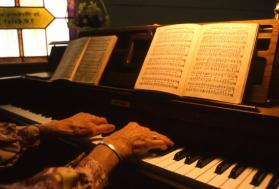China has promised $600 million in aid and loans to Cambodia. Half the aid is for a hydro-electric project, and some is earmarked for bridges and new government offices.
(full report)
China Pledges $600M to Cambodia for Building Projects
April is National Poetry Month
 The Academy of American Poets established National Poetry Month in 1996. Their website is in celebration mode and lists 30 ways
The Academy of American Poets established National Poetry Month in 1996. Their website is in celebration mode and lists 30 ways to engage yourself in poetry this April.
Submit Your Good News Poem
In celebration of poetry month,
the Good News Network invites you to
submit your short poem to share with our readers.
(Just use the Submit link in the left menu.)
Oil Prices Spark Alternative Energy Renaissance
Going Green, a special report by CNBC features corporations that are finding new ways to save money with alternative energy. Three separate stories indicate the driving motivation behind the companies going green is their bottom line:
The potential savings are huge. Industrial use accounts for about a third of energy consumed in the U.S., according to Energy Dept. estimates. And by cutting back on just 20 percent of that consumption, American businesses could save close to $19 billion a year, according to the National Association of Manufacturers.
And, about 30 percent of those savings can be achieved with no capital investment!
In the Deep Seas Fish are Booming, Study Says
 A sweeping view by camera of the ocean floor, and research by David Bailey at the Scripps Institution of Oceanography in La Jolla, California, reveals that sea stars (starfish), sea cucumbers, sand dollars, and sea urchins have been flourishing. Their abundance is increasing the food supply for other fish and triggering an increase in deep-sea populations, said Bailey.
A sweeping view by camera of the ocean floor, and research by David Bailey at the Scripps Institution of Oceanography in La Jolla, California, reveals that sea stars (starfish), sea cucumbers, sand dollars, and sea urchins have been flourishing. Their abundance is increasing the food supply for other fish and triggering an increase in deep-sea populations, said Bailey.
Maryland Adopts Historic Global Warming Law Mandating Pollution Reduction at Power Plants
ANNAPOLIS, Md., March 31 — In a major victory against global warming, the Maryland General Assembly gave final approval Friday to the strongest power-plant cleanup bill ever passed by a legislative body in America.
In addition to dramatically reducing nitrogen, sulfur and mercury pollution, the Maryland Healthy Air Act requires that the state join the Regional Greenhouse Gas Initiative (RGGI), a consortium of eastern states committed to mandatory CO2 reductions from power plants.
No state in America has Passed Legislation that Reduces all four Power Plant Pollutants in such an Aggressive way.
After a two-year campaign led by the Chesapeake Climate Action Network and a coalition of other environmental, faith, and health groups, the so-called 4-pollutant bill passed by veto-proof majorities in both Maryland houses. Aides to Republican governor Robert Ehrlich say the governor does not intend to veto the bill.
New Vaccine Prevents Cervical Cancer
A new vaccine will prevent hundreds of deaths from cervical cancer each year in the UK, the BBC reports today. After receiving the vaccine injection, women are protected for four years.
Two Lost Worlds Give Us Hope – by David Suzuki
February 15, 2006 — Two lost worlds were in the news last week. One was discovered halfway around the world, but the other is right here in Canada.
The first was a never-before examined patch of tropical rain forest deep in the heart of New Guinea. It’s likely one of the most biologically diverse areas on Earth, and it shows how little we really know about life on this planet.
An international team of scientists recently returned from the Foja Mountains of New Guinea having discovered 40 extremely rare mammals, including the golden-mantled tree kangaroo, which was thought to have been hunted to near extinction.
They also discovered four new butterfly species, a new bird species, 20 new frog species and many previously unknown plant species. Having never encountered humans, some of the creatures were so unafraid of people that researchers could simply pick them up off the ground.
That places such as this still exist is cause for hope. With well over 6 billion people on the planet and an insatiable appetite for resources, pristine places are becoming increasingly rare and species are disappearing at an alarming rate. Yet scientists have only studied a small percentage of life on Earth. Researchers estimate that there are literally millions of species out there that we have never examined and have no clue what they do in an ecosystem. As Oxford entomologist George McGavin points out: in a tropical rain forest, every second or third insect you pick up is probably unknown to science.
The other lost world in the news last week is also a remote and incredibly diverse rainforest — but this one is in Canada. British Columbia’s north and central coast, known as the Great Bear Rainforest, is unique; it is special and it contains creatures found nowhere else in the world. Most people know about the Kermode bears that live on this coast. They’re a white version of the black bear, found only in this area. And their differences extend to more than just fur colour: researchers are finding that they behave differently too.
A new agreement will protect Great Bear for future generations
Wolves of the Great Bear are also different — smaller, more agile and specially adapted to forage for the bounty of sea life found along the shore. Then there are the salmon, which researchers have found are vital to the health of the forests and many land-dwelling creatures. Hundreds of unique runs of salmon find their way back to the Great Bear every year to spawn.
The Great Bear Rainforest made international news last week because the B.C. government, along with First Nations, environmental groups and the forest industry, have drafted a plan to protect a portion of it. That’s good news for science and good news for the people who depend on the health of this ecosystem for their livelihoods.
The story is only partially complete, however, as discussions are still underway as to what kind of logging will take place in the parts of the Great Bear outside the protected areas. This is critical because unprotected areas make up more than 70 percent of the land base and contain the majority of salmon streams and much of the best wildlife habitat.
Scientists have only just begun to understand this magnificent region and all the life within it. The recent agreement, if combined with truly sustainable logging practices outside the protected areas, could keep this ecosystem functioning, allow economic activities such as tourism and logging to co-exist and give scientists a chance to understand more about Canada’s own lost world.
It’s an opportunity we would be foolish to pass up.
Catholics and Pentecostals Unite for the First Time in U.S.

NEW YORK (ENI) — After nearly five years of discussions and planning, a new group for all the major Christian traditions in the United States, including Roman Catholics as well as Evangelical and Pentecostal denominations, has been formally launched.
Christian Churches Together in the USA (CCT), calling itself “the most inclusive fellowship of Christian churches and traditions” in the United States, was inaugurated on March 28. It marks the first time that bodies representing the five major Christian traditions in the United States — Evangelical and Pentecostal, Protestant, predominantly racial/ethnic churches, Orthodox, and Roman Catholic — have come together at a national level.
“We finally found the courage to confront our obvious and longstanding divisions and to build a new expression of unity, rooted in the Spirit, that will strengthen our mission in the world,” the Rev. Wesley Granberg-Michaelson, general secretary of the Reformed Church in America and interim CCT moderator, said in a statement.
The creation of CCT is the first time that the U.S. Conference of Catholic Bishops has joined such a church association.
The launch had been delayed in mid-2005 after concerns were raised by leaders of predominantly black churches as to whether another national ecumenical body was needed in the United States alongside the U.S. National Council of Churches (NCC). They also questioned whether the new grouping would address concerns important to their members, such as racial and economic justice.
The statement announcing the launch of the new grouping noted that overcoming poverty was “central to the mission of the church and essential to our unity in Christ,” and that participants had committed themselves to work together to address the causes of poverty.
Granberg-Michaelson made clear that membership now includes representation from the five major church groupings in the United States, including the historic black churches. Christian Churches Together is not seen, at least for now, as supplanting the NCC. The Catholic Church, the largest denomination in the United States, does not belong to the NCC nor do many evangelical or Pentecostal groups.
CTT, however, includes participation by a variety of groupings. They include several Orthodox churches; Protestant groups as the Evangelical Lutheran Church in America (ELCA) and the Episcopal (Anglican) Church; and bodies such as the Salvation Army, Open Bible Churches, International Pentecostal Holiness Church and the humanitarian organization World Vision.
Spanish Evangelicals Urge Forgiveness to Make ETA Cease-Fire Work
(ENI) The cease-fire by Basque separatist group ETA will need to be accompanied by justice and forgiveness if it is to achieve a lasting peace, a group of Spanish evangelical Christians has said, while the leader of Spain’s Roman Catholics has urged politicians to unite and work for peace.
The Evangelical Council of Madrid said the time had come for Spanish evangelicals to speak out in theological language that may pave the way towards peace, even at the risk of being called “naïve.”
Canadian Grocery Chain to Push Reusable Bags
 Canadian grocery retailer Provigo started pushing a 99-cent reusable bag at their 456 stores throughout Quebec. One environmental blogger writes:
Canadian grocery retailer Provigo started pushing a 99-cent reusable bag at their 456 stores throughout Quebec. One environmental blogger writes:
Spina Bifida Kids Grow New Bladders with Scientists’ Help
A new procedure pioneered at Wake Forest University in North Carolina has given seven kids new bladders that were grown from the children’s own cells. The procedure is being called a long-term success and there is no risk of rejection, like in a traditional transplant, because the cells are their own. CNN reports on this scientific marvel.
First Brazilian in Space
 Brazil’s first astronaut docked at the International Space Station. Marcos Pontes and his American and Russian crewmates arrived in their Soyuz spacecraft, while in Brazil, Pontes’ family and countrymen were overcome with pride. Sky.com reports:
Brazil’s first astronaut docked at the International Space Station. Marcos Pontes and his American and Russian crewmates arrived in their Soyuz spacecraft, while in Brazil, Pontes’ family and countrymen were overcome with pride. Sky.com reports:
Image above: Expedition 12 and Expedition 13 crewmembers greet each other inside the Destiny Laboratory. From left are Expedition 13 Commander Pavel Vinogradov, Brazilian astronaut Marcos Pontes, Expedition 12 Commander Bill McArthur, Expedition 13 Flight Engineer Jeff Williams and Expedition 12 Flight Engineer Valery Tokarev. Photo Credit: NASA TV
Teach a Village to Farm, and Feed them for Life
Sauri, Kenya is the first village to benefit from the Millennium Village Project begun 18 months ago. Based at Columbia University, the program is teaching Sauri’s 5,100 villagers how to farm and be successful. And it is working. Associated Press reporter Chris Tomlinson says: the village has "doubled farm output and gone from depending on handouts to donating food to the needy."
The poverty experts now based at the village point out that it costs ten times as much money to give the poor a hand-out as to create self-sufficiency across the spectrum. There is no hunger in the village anymore, the people are empowered, they are ready to join the marketplace with their cash crops, and the experts will be leaving soon.
(Kudos, once again, to AP for delivering another enriching story through the media!)
Kuwaiti Women Vote for the First Time
 Kuwaiti women are voting for first time after they were granted equal political rights in May 2005. 28,000 Kuwaitis are being polled today in a local election to fill a vacant council seat. 60% of the voters eligible to vote are women and they will have the chance to vote for the first women candidates to ever appear on a Kuwaiti ballot. Women will vote in widespread national legislative elections in 2007. The BBC reports on the excitement and pride the women are feeling today.
Kuwaiti women are voting for first time after they were granted equal political rights in May 2005. 28,000 Kuwaitis are being polled today in a local election to fill a vacant council seat. 60% of the voters eligible to vote are women and they will have the chance to vote for the first women candidates to ever appear on a Kuwaiti ballot. Women will vote in widespread national legislative elections in 2007. The BBC reports on the excitement and pride the women are feeling today.
Improving your Chances for a Business Loan
.jpg) Neil’s column regularly appears in the Good News Network.
Neil’s column regularly appears in the Good News Network.
Your goal is to secure financing. Your prospective lender’s goal is to understand your company’s dynamics and cash flow so well that he or she becomes comfortable with lending you money. Therefore, to best meet your need for capital, you should try addressing the needs of the lender first.
The most important thing to know about seeking capital is that lenders have a limited amount of time to review a loan request. It is not possible for a lender to be familiar with every industry, so your first priority should be to help them understand the industry in which your business operates. This will make them more comfortable with your company, less skeptical and cautious, and will improve your chances of securing the loan your company needs.
Specifically, you’ll want to discuss a number of factors that influence a business in your industry, including driving forces, risks, and how you mitigate risks.
1. Talk about key driving forces in your industry.
Green TV Launches
 We have a Food Network, a Style Network, a Shopping channel, why not a Green channel? The world’s first online ‘green’ television channel launched Friday from its virtual studios with the backing of the United Nations Environment Programme (UNEP). Green.tv podcasts are also being offered and featured prominently on iTunes.
We have a Food Network, a Style Network, a Shopping channel, why not a Green channel? The world’s first online ‘green’ television channel launched Friday from its virtual studios with the backing of the United Nations Environment Programme (UNEP). Green.tv podcasts are also being offered and featured prominently on iTunes.
Promotional videos welcome viewers to the homepage with exceptional quality that generates excitement. If half of the programming looks that good — think National Geographic — internet audiences will be in for a treat.
China Spends $1Billion on River Clean Up
China will invest around 1.2 billion USD over the next five years to curb the pollution of the Songhua River, funding more than 200 projects, half of which will address industrial pollution, 70 will focus on sewage processing.
Lost an iPod or Laptop? Check Online
Honesty and thoughtfulness abound. Check out this Associated Press story about people whose lost items are returned to them via online message boards like Craig’s List. Kudos to the reporter Andrew Ryan for focusing on these truly wonderful stories that happen to average people every day. They renew our faith in the human race.
The Lost and Found page on Craig’s List today in D.C. featured notices by honest people who found car keys, a Sirius player, an iPod Nano, a bird and a passport. Keep up the good work!
Sri Lankans Endorse Peace Talks with Insurgents
 Sri Lankans overwhelmingly elected local officials from the country’s ruling party today signaling a thumbs up to President Mahinda Rajapake for his handling of peace talks with rebel Tamil Tigers. The opposition party, which is opposed to offering any consessions to the rebel group — and had previously controlled most councils — garnered just 12% of local seats on the 264 councils where results were declared. President Rajapake is eager to move ahead with peace talks and reach a settlement.
Sri Lankans overwhelmingly elected local officials from the country’s ruling party today signaling a thumbs up to President Mahinda Rajapake for his handling of peace talks with rebel Tamil Tigers. The opposition party, which is opposed to offering any consessions to the rebel group — and had previously controlled most councils — garnered just 12% of local seats on the 264 councils where results were declared. President Rajapake is eager to move ahead with peace talks and reach a settlement.
Terrorism experts say the Liberation Tigers of Tamil Eelam (LTTE) have staged two-thirds of all the world’s suicide bombings in its quest to gain a separate homeland for ethnic Tamils in Sri Lanka. But in February 2002, the LTTE signed a permanent cease-fire with the government and in the following months decommissioning of weapons took place. In December 2002 the government and the rebels agreed to share power.
Cultivating a ‘Good Heart’ Through Meditation: A Brazilian Research Study
(Northeastern Brazil) In Fortaleza, a town of 2.5 million people, the poor and the rich will meet once a week to cultivate a "good heart" through meditation. The program is based on work by Dr. B. Alan Wallace, which is understood as the conquest of our inner fears with the realization of the natural resources inherent in our heart and minds. This eight-week clinical program will teach a dozen people the process of mindfulness meditation, a nonjudgmental acceptance, and an empathic attitude, and initiate a daily practice of shamatha meditation homework. This combined approach aims at developing loving-kindness, compassion, empathetic joy, and equanimity that is summarized as cultivating a good heart and genuine happiness.
Beyond the learning and practicing sessions, participants will be writing or drawing a diary of images and feelings that boil up during the meditations. A final session will qualitatively evaluate the participants’ experiences. This program is free of charge from the Universidade de Fortaleza (Brazil) under the guidance of psychology professor Francisco Cavalcante, Jr., Ph.D.
His RELUS Network of Happiness Studies brings together researchers and practioners from the Portuguese speaking world interested in the happiness studies. People from all over the world are welcome to contribute. (info submitted by Andre)





















.jpg)